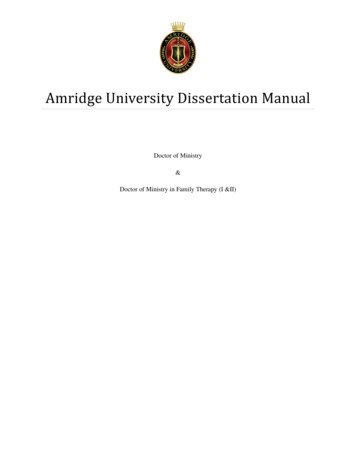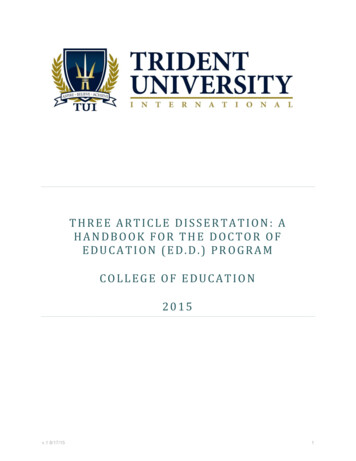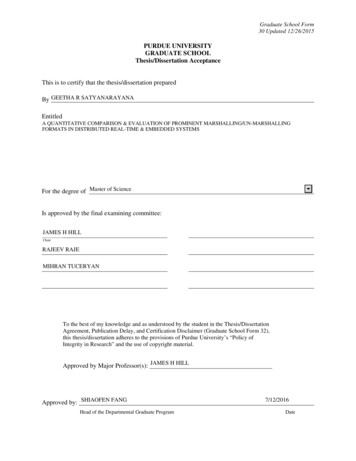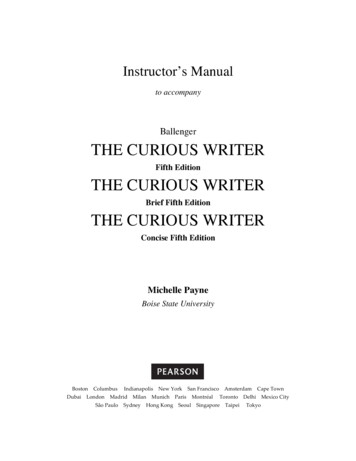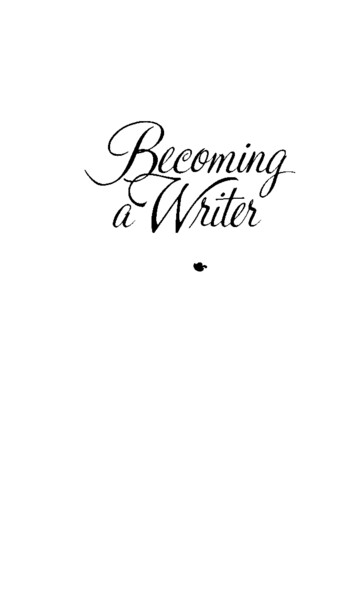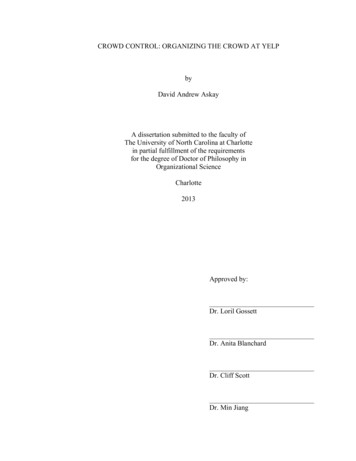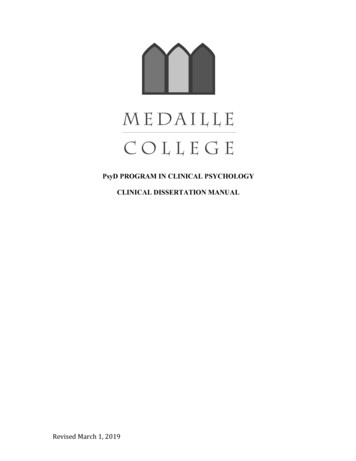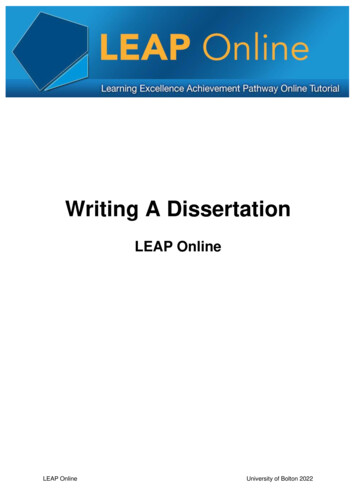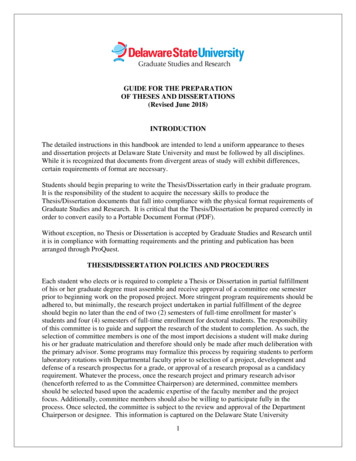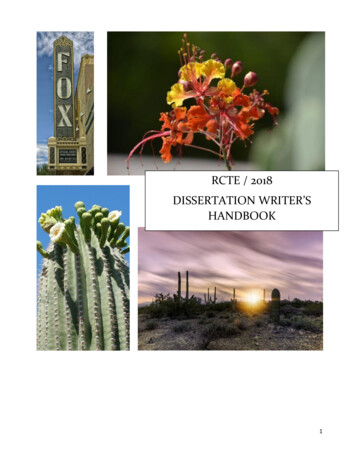
Transcription
RCTE / 2018DISSERTATION WRITER’SHANDBOOK1
The Dissertation Writer’s Handbook2018Table of ContentsChapter 1: What is a Dissertation? . 4Chapter 2: Putting Your Committee Together . 5Chapter 3: The Dissertation Proposal . 7Chapter 4: Writing the Dissertation . 11Chapter 5: Defending Your Dissertation . 14Chapter 6: After the Dissertation . 16Appendix A: Sample Timeline for Completing the Dissertation Proposal . 17Appendix B: Divergent Paths through the Dissertation Process . 21Appendix C: Human Subjects Research in RCTE . 23Appendix D: Human Subjects Research Review Timeline . 25Scenarios . 27Book recommendation: Destination Dissertation: A Traveler’s Guide to a Done Dissertation bySonja Foss and William WatersOther helpful links include doctorphilosophy#dissertation, “Expert Advice: Thesis/Dissertation” and “Expert Advice: JobSearch/Career Planning”2
Dear Reader,This Dissertation Handbook outlines the dissertation process to answer questions such as these:1) How do you choose a topic?2) How do you put your committee together?3) What resources are available to write a dissertation?If you have a question, please contact your dissertation director. If there is still some confusion,please contact the Program Director and/or the Program Assistant.Thank you,The RCTE FacultyRevised: October 20183
Chapter 1: What is a Dissertation?After you have completed your doctoral course work and the comprehensive exams, you areconsidered All But-Dissertation or ABD. Now, the dissertation phase of your doctoral careerbegins! The faculty do not expect you to undertake such a project without guidance. You willlikely need a semester between completing your Comprehensive Exams and writing yourdissertation to explore some ideas and develop a fairly detailed description of your overallargument.Important points to remember: Once you pass your Comprehensive Exam, you will be automatically charged 35 by theGraduate College for your degree candidacy fee.As soon as you know who will be on your committee please fill out the DissertationCommittee Appointment form.Selecting a TopicTo find a timely topic that is of interest to the discipline and you, you will need to reflect backover the ideas you have been developing in your courses and comprehensive exams and thenconsider what gaps, issues or problems in the field you would like to address. You want to selecta topic that will do more than get a dissertation written. The dissertation should open out intofurther research. In the eyes of hiring committees, the dissertation will define who you are as apotential colleague and your possible future contribution to the field. It pays to find a topic thatmay do well by you in all these respects.You may have heard that you should begin thinking about your topic for your dissertation fairlyearly in the Program.Here are some specific ways you can help this thinking along: Volunteer as a CCCC bibliographer (see Director), or look through Dissertation AbstractsInternational. Examine the recent programs for professional conventions. Review professional disciplinary journals from the last ten years. Think of papers written for classes as ways of investigating possible topics. If papers forclasses can become chapters in your dissertation, you are way ahead. Continue to discuss your research agenda from your Qualifying Exam with your mentor. Use the Comprehensive Exams. You can develop your Reading List in such a way as toadvance your work on your dissertation. Comprehensive Exams are intended first of all toexamine general knowledge of the field to show readiness to do more specialized work,but it is often in preparing these lists that a topic comes into focus. Consult sample dissertation proposals on file with RCTE Program Assistant. Review dissertations (available through the UA library on ProQuest).4
Chapter 2: Putting Your Committee TogetherImportant points to remember: Select your dissertation director first before selecting any other committee members. Your dissertation director must come from your major program of study. Your proposal--even in draft form--can help you recruit committee members. Before starting the writing process, you should negotiate a clear understanding with eachsecond, third, and fourth committee member, as to what they wish or do not wish to read.Begin the process of actively recruiting your dissertation committee early in the summer orfall semester immediately after successfully completing your comprehensive exams. Theselection process takes time. Your committee should meet the following requirements: The Graduate Council and the Faculty Senate have approved a central requirement ofa minimum of three members from the major, all of whom must be University ofArizona tenured, tenure-track, or approved by the Graduate College as equivalent. Inother words, you should have three (3) RCTE or RCTE Affiliate Faculty committeemembers. For additional clarification see next section.Selecting a Dissertation DirectorYour director must be from RCTE. The other two members should also be from RCTE unless youhave consulted with and received approval from the RCTE Program Director.You may have additional members outside of RCTE, such as a fourth member, who may be fromanother institution but a minimum of three of your committee members must be currentUniversity of Arizona faculty members. All dissertation committee members outside of RCTEmust be approved by your director, the program director, and the graduate college.Select your director based first on her or his expertise (primarily) of the subject area ormethodology of your project. Other options you should consider when selecting a dissertationdirector: Availability: Is the person on or going to be on sabbatical? Is the person already directingand mentoring too many doctoral students’ projects? Accessibility and reliability: Does the faculty respond promptly to requests formeetings and follow up as requested? Engagement with your work: Does the faculty member work in related areas? Do youwork well with the person? Has the person worked with your writing in a way that hasbeen helpful?The dissertation director, also referred to as the committee chair, is the most important memberof the committee because she or he will be the principal reader of your drafts and advisor onresearch, and even your recommendation letter writer. Work closely with your dissertationdirector to review, comment, and approve each draft of a dissertation chapter. Each first draft of5
your dissertation chapter must go through your dissertation director before they go out to therest of the committee. The recommended time for feedback for a dissertation chapter is twoweeks, unless otherwise agreed upon. A fourth member, whose feedback may be minimal, mayread your drafts on special occasions and for specific purposes.Remember that committee members often need to be persuaded to serve and that the supply offaculty is finite. Think of all the professors you take classes from as potential members of yourdissertation committee. You should write up a draft dissertation proposal before forming yourcommittee. At a minimum, you should give committee members a brief outline before askingthem to serve.Additional Graduate College GuidelinesMany departments require faculty from the minor to serve on the committee in addition to thethree from the major, in which case one member may be a special member. If a committee hasonly three members, all must approve the dissertation. In departments that require four or fivemembers, there may be one dissenting vote. All dissertation committee members are expected toattend the final defense.6
Chapter 3: The Dissertation ProposalImportant points to remember: It is advised that you should meet at least 3-4 times with your Dissertation Directorduring the semester you are writing your dissertation proposal. Dissertation proposals tend to be 7-15 pages long (single-spaced, 1” margins) dependingon the number of chapters anticipated for the completed manuscript.The Dissertation Proposal is a document that advanced (All But Dissertation – ABD) graduatestudents compose in order to clarify for themselves and their advisors why and how they willresearch, organize, and write their dissertations. It is less of a blueprint—which is, by definition,a fixed and fully formed set of specifications— than an “architectural scheme,” that is, asomewhat detailed sketch that systematically captures the essence of a project and describes anaction plan for carrying it out. Such a document can emerge in many ways and the writing andpresenting of it serves many functions.Students typically find that through drafting the dissertation proposal—a process that is equalparts idea generation, sifting, reviewing, selection, and description— they become keenly awareof several needs as they build their expertise: when their theoretical frameworks need bolstering, when their research questions are too vague, when they are being overly ambitious about their objectives, and when their research methods do not fit the question.Once identified, such needs and weaknesses can be addressed and corrected.For faculty, dissertation proposals are a chance to help students hone their professionalacademic skills and avoid some of the research and writing obstacles that can only be identifiedwith experience. It also gives faculty a chance to become oriented to each particular student’sway of thinking about certain kinds of problems, from philosophical paradoxes to timemanagement issues. By discovering such information early on, faculty are in a much betterposition to offer helpful counsel throughout the actual dissertation writing process.As you develop your proposal, be mindful of the various strengths and weaknesses of yourcommittee members and assemble a document that will give each of them the most usefulpicture of your project as you envision it. Say, for example, you are planning to write adissertation on the impact of social media on students’ online interactions in a composition class.If you know that one of your committee members has expertise in the area of teachingcomposition while another has done more specialized research on teaching on line, then youmight want to add a sentence or two that will help each of these members to understand yourproject given their scholarly strengths and limitations. To put it simply, write your proposal likethe trained rhetor that you are.7
Your expertise with assessing rhetorical situations and audiences will help you achieve yourbroader purpose in writing your proposal, which is the same genre as a book proposal. Whiledissertation proposals are a bit different than those for books, many of the elements are thesame. In writing the proposal with the help of your Dissertation Director, and in presenting it toyour Dissertation Committee, you (will gain excellent experience with a professional andrhetorical art that could have a profound impact on your ability to advance in the academy andbeyond. (See Chapter 6 of this Handbook).Lastly, a significant factor in the successful completion of both the dissertation proposal and thedissertation is careful stewardship of your time. It is imperative that once you have completedyour Comprehensive Exams that you select and or consult with your Dissertation Director assoon as possible (within four weeks at the outside), preferably with a first rough draft or noteson your dissertation proposal in hand. As you move forward, your Director will work with youon early drafts of the Proposal and help make it a much more cohesive document.**(See the Program Assistant for Dissertation Proposal samples.)Dissertation Proposal ElementsYour Dissertation Proposal should have the following elements, though the structure may vary ifyou are doing an empirical research study or a multimodal dissertation that adopts a morenarrative structure. This outline is not meant to imprison your creative process as you designyour dissertation. Rather, they are meant to provide a simple structure through which you caneasily record for yourself and convey to your committee members the basic plan you have fordoing your dissertation. Faculty members are well aware that this plan will gradually change asyour research matures and your arguments become clearer. This is a common phenomenonwhen planning any major project.1. Description of the Project (one to two paragraphs)o Initial statement of the issue or problem and its implicationso Focused research question and general overview of approach2. Defense of the Approach (two to three paragraphs)o Explanation of why this research needs to be done, including the importance of theproblem and the potential contributions to the disciplineo Overview of methodology and/or theoretical framework3. Chapter by Chapter Outline (generally one paragraph per chapter)o This section generally outlines the arguments of the chapters and the ways theyadvance the overall argument, though the chapter summaries may also beorganized around the format used in empirical research studies with an initialoverview and subsequent chapters on the methods and other elements. Morehybrid and narrative formats are also possible.8
4. Projected Research (up to 2 pages)This section should review the research on the major issues, concerns, and questions andsummarize the major lines of research to be pursued. You may list the resources youimagine you will need to consult in order to complete this project, includingo readings you expect to do (include all bibliographic information);o people to interview;o films, television programs, recordings, and videos to consult;o special libraries and archives to visit; ando community events and consultations to consider.5. Timetable: Your timetable toward completion should include entries for the following:o completion dates for each chapter’s draft and revision;o the months in which you plan to be on the job market (most students find thatworking on the dissertation during these months—usually October throughFebruary—nearly grinds to a halt);o the projected date of the defense;In developing your timeline, do not forget to take into account the buffer periods atthe start and end of each semester (during which faculty may choose not to respond toyour chapters), as well as holiday, and semester and summer breaks.If, after reading over the finished draft of your dissertation proposal, the outline of the projectseems a bit hazy and unclear, that may well be okay since writing the dissertation itself willinevitably clarify many things as you go. Nonetheless, you will know that you have a solid draft ofyour proposal—neither too sketchy nor too elaborate—when you have completed all of thesections listed above, read over the entire draft, and—perhaps in addition to feeling that thechapters are a bit misty—have the sense that it represents an exciting and manageable projectgiven your timeframe and available resources. If you do not get this sense after rereading it, keepworking on it until you do. Then submit the draft to your Director to see if she or he thinks theproposal is ready to go to committee.9
Dissertation Proposal Review MeetingAs noted in the Sample Post-Comprehensive Exam Timeline above, your Dissertation Directorwill work with you on preparing your proposal and will decide when it is ready to go before yourcommittee. This meeting is one hour in length and will be a chance for you and all of yourcommittee members to meet and discuss your proposal in detail. Their comments may addressissues such as: the soundness of your methodology; the clarity of your writing; the cohesiveness and clarity of your arguments, both those within individual chapters andthe one that stretches across the entire dissertation; the importance of your project to the field; the reasonableness of your timeline; the lack of key resources noted in your “Projected Research” section; comments about how this project may help or hinder you on the job market and in yourpostdoctoral work.NB: It is at the discretion of individual committee members whether or not they will providefeedback on the proposal prior to the official Dissertation Proposal Meeting.] The proposal issent to the committee at least ten days before that meeting. At the meeting the proposal isdiscussed. It may be accepted as is, returned for minor revisions, or returned for major revisions.If the revisions are major, another proposal meeting must be held. Additionally, the student willlikely need to discuss with the Dissertation and Program Directors the matter of not having anapproved dissertation proposal until the second semester after the comprehensive exams.Human Subjects ReviewIf you are proposing to do a project involving human subjects (interviews, oral histories,observation studies, and/or experiments), you should begin the process of receiving formalapproval from the Institutional Review Board (IRB) as soon as your Dissertation Proposal hasbeen approved. To learn more about this process and to figure out if your research will need IRBapproval, see Appendix A.Unsatisfactory ProgressIf, after one year from the date of the successfully completed Oral Comprehensive Exams, yourdissertation committee concludes that a sound proposal has not emerged, it may recommend tothe Program Director that you not continue graduate studies in the UA RCTE Program.10
Chapter 4: Writing the DissertationImportant points to remember: You have to stop reading at some point. Start writing early. Set a regular writing schedule. Have a life.Engage in wellbeing strategies. Primary responsibility for responding to drafts lies with the Chair. Other committeemembers may or may not respond to drafts. This time overlaps with the JOB SEARCH process. (See sub-section below.)**Here is a ProQuest link that also gives excellent advice on the writing of the dissertation.Doing the WritingDon’t postpone writing until you are ready to deliver the last word on the subject.Dissertations are never the last word on the subject and never as good as their writers want.They may reflect disparate demands by committee members more than the writer’s viewpoint.They are almost never publishable without substantial revision.On the other hand, your dissertation will play an important role in getting you a job, and if yourdissertation is not something that can become the basis for your first book, you will be at adisadvantage in your efforts to get promoted or to move to another job.The following tips have helped many of our RCTE dissertation writers move through the processquick, efficiently, and successfully landing a job! Start writing early. Don’t wait until you have done “all the reading.” You will have to dothe reading you will have to do, but if you are writing as you do it, your reading will bemuch more efficient and effective. Set up a regular writing schedule. Keep to it. Allow yourself latitude in some matters,but not in keeping to your writing schedule. Form a writing group with people on your timetable. Writing groups can give youvaluable feedback and support. Being in a group helps you keep to your schedule, too. Give yourself deadlines. Give a schedule to your Chair. This will also help your Chairbudget time to read your drafts. When you and your Chair feel that chapters or portions of the dissertation are ready foreditorial response, the chapters or portions of the dissertation should be given to allcommittee members at the same time. Use the Dissertation Chapter Review Form as acover sheet for all materials submitted to the committee.11
Primary responsibility for responding to drafts lies with Chair. Other committee membersmay or may not respond to drafts.All submissions of drafts to committee members must have the official Chapter Review Formwith the following information: Table of contents/outline of whole dissertation. Candidate’s sense of where the draft is in the writing process, what is left to be done tocomplete the writing. What revisions have been done since last submission. Specific questions about the drafts to which response is desired.Remember, the Chair will read your drafts carefully. If you want other members of yourcommittee to read your drafts, you should ask them specific questions. The other members willneed to be focusing most of their attention on the dissertations they are directing.Have a life. Come to talks. Sit in on classes. It is easy to feel isolated when you stop taking classes.The Job Search – Overlap with writing the dissertation**Here is a link from ProQuest with “Expert Advice: Job Search/Career Planning”Completion of the dissertation and going on the job market go hand-in-hand. The FALL semesterbefore you defend your dissertation is also designated as the time that you will go out on the jobmarket. If you plan to go on the job market the same year that you are completing yourdissertation (this is not a requirement, but if you follow the process, this will be the case), youMUST have a major portion of the writing done by the beginning of the fall semester (RCTEPolicy.) Importantly, hiring committees will not be interested in you unless you can convincethem, with concrete evidence, that you will have defended your dissertation by the time youcome to work. If they have doubts, they may ask for letters from your Chair or the DepartmentHead.Here’s what you need to know to prepare for this time:The SUMMER right before the FALL of your final year you defend your dissertation is also acrucial writing time. Per RCTE policy, graduate students are required to have three (3) chapterscompleted and circulated to their dissertation committee before they can move forward with thejob search process. With this policy, it is important then that you plan your writing time over thatsummer accordingly.This 3 chapter completion policy is in place for several reasons. Having the dissertation mostlycompleted with 3 chapters will give you both breathing room for the intense effort of the jobsearch and time to revise and make changes with any of the comments made by your directorand/or committee.12
Each FALL, the RCTE program supports and schedules the JOB WORKSHOP. This workshopincludes help with and review of: Letter writing skills and tips, Review of teaching, administrative, and personal statements that are asked for during thehiring process, CV workshops, and Mock interviews.13
Chapter 5: Defending Your DissertationImportant points to remember: Check-in with the Graduate College early for important timelines and due dates. Ask for letters of recommendation early. **Note: In order to ask for letters, you must have3 fully completed dissertation chapters submitted to and seen by your dissertation chair. Set the dissertation defense date at least two months in advance. Set the dissertation defense date at least two weeks before the final due date of thedissertation to the graduate college. This allows you time to attend to the edits, revisions,and formatting. A few weeks before you defend, familiarize yourself with the UA Graduate College“Archiving the Dissertation” If possible, have a colleague or friend in your program read through your paper. They maycatch mistakes your committee members do not. (This is why writing group relationshipsare so important!)The time passes quickly, and you are now two semesters away from defending thedissertation. You have now (before the fall of your final year) completed 3 full chapters, with allof them approved by your dissertation Chair. (This is RCTE policy.) The fourth chapter is alsomore than half-way completed and the fifth chapter is burning a hole in your outline. In otherwords, you are so close to finishing, you can taste it. Your hard work and dedicated time has paidoff!According to Destination Dissertation: A Traveler’s Guide to a Done Dissertation by Dr. Foss and Dr.Waters there are three parts to a dissertation defense: Preparation Defense, and Follow-up.PreparationSonja Foss, a communication scholar, would say that the dissertation defense begins when youstart writing the dissertation. While in the phase of writing the dissertation, you are honing yourknowledge on your topic, digging deep into the research, and learning ways in which to applythat knowledge. Though you may have amazing scholars sitting on your committee, your topicand writing remains distinctive to you and the discipline with which you are framing it. Afterdefending the dissertation, you will be considered the expert in that topic.Here are some other tips from Destination Dissertation: A Traveler’s Guide to a Done Dissertationby Dr. Foss and Dr. Waters14
Attend dissertation defenses of your friends and colleagues in rhetoric and other fields. Have your manuscript reviewed before the defense date in order to have all theformatting correct. Submit the full dissertation at the minimum of two weeks before the defense date. Askyour committee if they want a digital or paper copy. It is your responsibility to get them apaper copy if they request it. Review the PRE-Submission checklist through the Graduate College.To eliminate any surprises, it is important to keep close contact with your dissertation directorin the last few months of the process. Set bi-weekly or even weekly-meetings with her/him.Some of these meetings are just to check-in. Also in those meetings, you should bring up anyconcerns that you may have regarding your committee’s feedback (or lack of feedback), anddiscuss them with time.DefenseBefore the defense, talk to your Dissertation Director about her/his expectations of the processduring the dissertation committee.Here is a brief summary of the dissertation defense: Before the defense, prepare a 20 – 25 minutes presentation that proves a brief overviewof the main points of your dissertation to include - research question, literature review asit relates to your theory, methods and analysis, major findings and recommendations forfuture research. After your presentation, the invited audience will be asked to step outside and the defense– a two hour discussion / question / answer session will commence. Anticipate questions from your committee in which they identify a weakness in yourresearch and what you will do this work in the future. You will be kindly asked to step outside for committee deliberation time. The desired outcome is that they will invite you back into the room and say,Congratulations, Dr. . They will give you immediate feedback and a pass with norevisions / with revisions. It is rare that a graduate student does not have to writerevisions. So more than likely, you will be asked for revisions. It’s normal.Follow-upAfter your dissertation defense, set a meeting with your director to review the revisions andedits that were requested from the committee.15
Chapter 6: After the DissertationCONGRATULATIONS! You have just completed a major milestone in your career as well as yourlife! Go celebrate.However, you are not completely done! Immediately following the dissertation defense, makethe changes and edits your committee asked for. Also, at this point you are now familiarized withthe UA Graduate College Dissertation Formatting Guidelines. You will want to visit them again.It is difficult to overemphasize how important a milestone the dissertation represents in yourprofessional development. If you put in the requisite time and effort, it will be the springboardinto your first job and a steady stream of professional publications that will help you achievetenure and promotion. Inserting your perspective into the disciplinary conversation is achallenging albeit rewarding process that requires becoming familiar with a large body ofknowledge and an understanding of some historical traditions.Hopefully, your steady reading through the reading list in your first few years of the program,your preparation for the preliminary exam in the comps workshop, and your own efforts inbuilding an individualized reading list based on your dissertation topic will enable you to feelconfident in speaking and writing to Rhetoric and Composition audiences. Learning aboutappropriate publication outlets, whether these be journals such as College English, RhetoricSociety Quarterly, College Composition and Communication, or a university or commercial press,will enable you to position your dissertation work for publication.The program encourages students to explore the contents of professional journals and universitypress books lists early on in their graduate school careers. Speak to faculty, who have recentlypublished articles in certain journals or books in lists that interest you, about their experiences.RCTE faculty are available to help you revise your course papers and dissertation chapters forpublication. Faculty might even be willing to share their recent book proposals with you. Craftinga journal article or book proposal takes a lot of time and effort so think ahead to e
beyond. (See Chapter 6 of this Handbook). Lastly, a significant factor in the successful completion of both the dissertation proposal and the dissertation is careful stewardship of your time. It is imperative that once you have completed your Comprehensive Exams that you select and or consult with your Dissertation Director as
